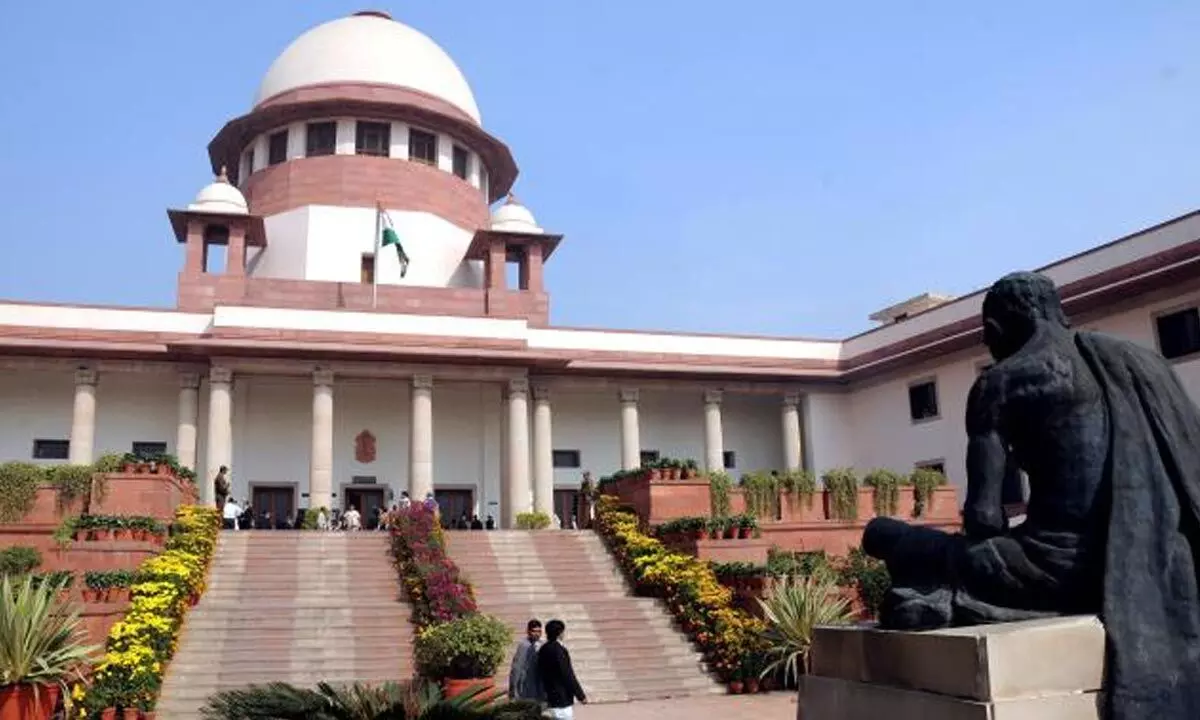Live
- Lathi-charge on students in Hazaribagh kicks up political row; demand for CBI probe grows
- India’s growth to rebound to 7 pc in 2025-26: Report
- Delhi has decided to elect BJP CM, oust AAP govt: Harsh Malhotra
- Congress-led UDF winning streak continues in Kerala, ruling CPI-M-led Left suffers reversal
- The Key Players Behind IPL: Discover the Franchise Owners and Their Success Stories
- Harris and Gill join Sydney Thunders for WBBL 11
- PKL Season 11: Bengal Warriorz coach Surve aims for maximum points to secure playoff spot
- Manchu Vishnu Warns Media Over Family Controversy, Mohan Babu Incident
- Atul Subhash’s Suicide Sparks Outrage; Estranged Wife, Judge Accused of Harassment
- Malaria cases, deaths in India decline by 69pc between 2017-2023: WHO
Just In
'Want a free but balanced press in India': Supreme Court questions anchors' roles

Supreme Court of India
The Supreme Court on Friday said the television channels are creating divisions in society, as they are agenda-driven and compete to sensationalise news, and anchors who try to create divisions in the society through their programmes should be taken off air.
New Delhi: The Supreme Court on Friday said the television channels are creating divisions in society, as they are agenda-driven and compete to sensationalise news, and anchors who try to create divisions in the society through their programmes should be taken off air.
It emphasised that a free and balanced press is wanted in India.
A bench of Justices K.M. Joseph and B.V. Nagarathna orally observed that channels are competing against each other, they sensationalise things, and serve an agenda.
Justice Joseph orally told a counsel, representing The News Broadcasters & Digital Association: "You (the news channels) create divisions amongst the society, or whatever opinion you want to create is much faster...".
As counsel said they are guidelines for anchors, Justice Joseph asked: "How many times have you taken off anchors, have you dealt with anchors in a way you send a message, see ultimately who controls the content of the programme anchor and editorial... if anchor himself or herself are part of the problem."
He added that the visual medium can influence much more than a newspaper and asked if the audience, are "mature enough to see this content?"
On her part, Justice Nagarathna said: "We want a free and balanced press in India... free but balanced."
Additional Solicitor General K.M. Nataraj, representing the Centre, contended that the government is contemplating a separate amendment to the Criminal Procedure Code and that is its stand in the matter.
Justice Joseph said: "Freedom of speech, the greater the freedom the better marketplace of ideas is very good. In the marketplace of ideas we have to also see populace... are we really a fully developed country?... are the audience mature enough to receive this kind of information that is dished out. If freedom is exercised with an agenda, then you are not actually serving the people."
The apex court made these sharp observations while hearing a clutch of petitions seeking action in hate speech incidents.
Justice Joseph also criticised the manner in which TV channels used words against the man accused of peeing in an Air India flight. He said that nobody should be denigrated and everyone has the right to dignity and media people must learn that they're occupying positions of great strength and what they're saying impacts the whole country. He suggested that offending anchors should be "taken off air".
In October last year, the apex court had ordered the Delhi, Uttar Pradesh, and Uttarakhand Police to take suo motu action in cases of hate speech without looking at the religion of the offenders.
On Friday, Nataraj submitted that a comprehensive amendment to CrPC is in the pipeline and the government is taking inputs from stakeholders and this has to go to the parliament and he cannot contemplate action of the legislature.
The top court asked the state governments to make their position clear on the broader issues projected in the case and also asked the amicus to submit draft guidelines in the case on the next date of the hearing.
The Uttarakhand counsel told the court that the state had registered 23 suo motu cases after the last order but it is facing difficulties in pursuing the cases in those circumstances where a police officer is both the complainant and investigator. Uttar Pradesh counsel said the same issue exists with the state's police and informed the bench that state had registered 581 cases and about 160 of them were suo motu.

© 2024 Hyderabad Media House Limited/The Hans India. All rights reserved. Powered by hocalwire.com






